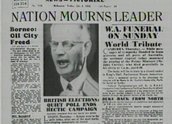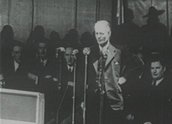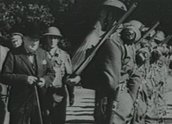


Hellfire Jack: The John Curtin Story (1985)
Synopsis
Produced on the centenary of John Curtin’s birth, Hellfire Jack: The John Curtin Story is an absorbing portrait of the life of the prime minister who led Australia for the vast majority of the Second World War.
Hellfire Jack covers Curtin’s childhood in Ballarat, where he left school at 13, his election to federal parliament in 1928 and as leader of the Australian Labor Party in 1935, but not before he had to overcome a severe drinking problem.
Curtin was sworn in as prime minister on 7 October 1941 and Hellfire Jack examines his leadership during the Second World War and his role in shifting Australia’s defence strategy away from the United Kingdom and toward the United States. Curtin died on 5 July 1945, just weeks before the Japanese surrender.
Curator’s notes
John Curtin (1885–1945) was Australia’s 14th Prime Minister and, like Sir Winston Churchill and Franklin Delano Roosevelt, wartime leaders of the UK and US respectively, he is widely regarded as a national hero. As with Roosevelt, he did not live to see the complete Allied victory. But there the comparisons to Churchill and Roosevelt end.
Hellfire Jack provides a detailed picture of Curtin’s childhood in Creswick, near the goldmining boom town of Ballarat in Victoria. The son of Irish immigrants, his father had been a respected policeman there. Several interviewees make the point that Ballarat and other Victorian goldfields played crucial roles in the evolution of unionism and political debate in Australia. As historian Professor Weston Bate notes, ‘rivers of ideas’ flowed from the thousands of hopefuls who flocked to the fields, only to be confronted by disappointment, hardship and harsh justice at the hands of authorities.
The early segments detailing Curtin’s formative years in Brunswick, Melbourne, produce some surprising facts, such as the short stint Curtin spent in the employ of celebrated Australian artist Norman Lindsay. Most valuable is the overview of Australia’s political and social landscape in the first 20 years of Federation. Trade unionism and socialism were huge influences in mainstream politics and on Curtin – he wrote articles for the Socialist newspaper and was organising secretary of the Sawmiller’s Union (Victoria branch) in 1911.
After failing at his first attempt to enter parliament in 1914, Curtin became a strong opponent of the pro-conscription referendums put forward by Prime Minister Billy Hughes and defeated in 1916 and 1917. He even spent three days in jail for ‘failing to enlist’ before the charge was withdrawn. He spent much of his adult life battling alcoholism and his life and career might have amounted to very little had it not been for the support of powerful mentors including future prime minister James Scullin and influential left-wing politician Frank Anstey.
Hellfire Jack frequently turns the spotlight on Curtin’s battle with alcohol and his family life. Curtin had become an alcoholic following his 1914 failure and moved to Fremantle, Western Australia, in 1917. With the support of Anstey, he was appointed editor of the Westralian Worker, serving until 1928 despite instances of erratic, alcohol-affected behaviour.
Eventually winning the federal seat of Fremantle at the 1928 and 1929 elections, Curtin was required to spend long periods in Canberra without wife Elsie and their children. In parliament he was noted for his outstanding speeches, but was known also for his heavy drinking and suffered terribly from the loneliness of forced separation from his family.
As many of the eminent historians and commentators in Hellfire Jack note, Curtin’s loss in the 1931 election ultimately proved to be his making. By the time he regained his seat in 1934 he had stopped drinking and had spent much time studying Australia’s defence requirements and formulating policies.
Once elected as leader of the Australian Labor Party in 1935, he never looked back. His determined effort to have Australian troops return from the Middle East and repel the Japanese advance toward Australia proved critical in the outcome of the war in the Pacific. Perhaps even more significantly in the larger context of Australia’s foreign relations, Curtin advocated much closer ties with the US (see clip three).
Narrated by Leo McKern (Travelling North, 1987; Rumpole of the Bailey, 1978–92) Hellfire Jack features outstanding archival footage, some very rare colour newsreels of wartime Australia (see clip three) and shines a valuable spotlight on the evolution of contemporary Australia.
See also Curtin (2007), which stars William McInnes as Curtin and covers 1941–45.
- Overview
- Curator’s notes
- Video 3 clips
- Principal credits
- Find a copy
- Make a comment
- Map
- Add your review



